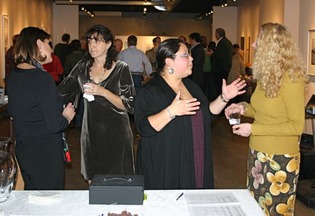 by David Sepulveda
by David Sepulveda
From the outside, the Friday evening event held at Kehler Liddell Gallery, looked like one of their regular exhibition openings — groups of people milling around, engaged and smiling amid spot-lit artworks.
Braving a rainy and wind-swept evening, over one hundred people turned out for the second annual Village to Village benefit, in what was billed as “an evening of wine, cheese, jazz, art, and a silent auction.” One could easily have added an evening of “celebration, joy and unity” to that description as attendees arrived to help build bridges of community between themselves and villagers from the town of Ejemekwuru in Nigeria, West Africa.
The fund raiser brought together Westville and greater New Haven residents and friends — those with religious proclivities and those without, in a multi-cultural gathering that had one purpose: to help the villagers of Ejemekwuru to help themselves. “New Haven is welcoming to the poor, the dispossessed and immigrants — our concern goes way beyond the boundaries of New Haven” said Westville resident and Hillhouse High School teacher, Jack Paulishen, one of the event’s organizers.
Around the gallery stood easels bearing photographic testimony of the good works of Marycare, the non-profit 501 C 3 organization that oversees operations and development in Nigerian villages and other parts of the world, and is the conduit for the funds raised in the Village to Village benefits.
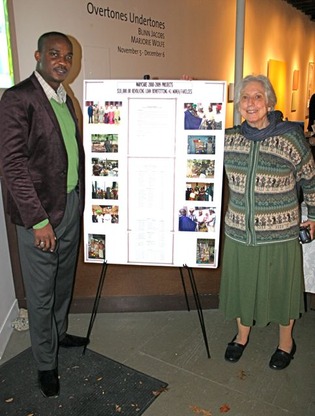 Anne Bates (at right in photo), a New Haven resident and founder of Marycare, was present and explained how it was that a Westville group’s initiative came to merge with Marycare efforts underway in Ejemekwuru: “I was away (in Argentina) and came back to find that a Westville group had organized on their own, the first Village to Village fund raiser. I was thrilled. Many of those organizers have since joined our board — they are now part of Marycare.”
Anne Bates (at right in photo), a New Haven resident and founder of Marycare, was present and explained how it was that a Westville group’s initiative came to merge with Marycare efforts underway in Ejemekwuru: “I was away (in Argentina) and came back to find that a Westville group had organized on their own, the first Village to Village fund raiser. I was thrilled. Many of those organizers have since joined our board — they are now part of Marycare.”
While the original organizers — Jack Paulishen, Anne Lozon, Tatiana O’Connor, and Jennifer Guarino — are part of the Saint Aedan parish, “There is no faith litmus test for those wishing to help” said Bates. “We have all kinds of people working with us including people who are not religious.” She underscored that in the Marycare organization there is no paid administrative infrastructure, and all proceeds go directly to the end users — people in need.
The idea for the first Village to Village fundraiser grew from the desire of a few Saint Aedan Church parishioners to thank their charismatic and beloved pastor, Father Emmanuel Ihemedu (at left in photo), for his exceptional service to the community. At the time, Father Emmanuel, as he is known, was a Saint Aedan and Saint Brendan assistant pastor. The group had approached the pastor with the idea of a fundraiser to help buy back land that his father, a subsistence farmer in Nigeria, had sold to pay for Emmanuel’s plane fare to seminary in Argentina. Encouraged by Anne Bates, whom he had met in Argentina, Emmanuel eventually moved to the United States to continue studies and receive ordination. While moved by the outpouring of appreciation from parishioners, Father Emmanuel asked that they instead direct their efforts to helping the people of his Nigerian village — people who were in dire need of necessities like clean water, medical supplies, and educational and economic development.
The first Village to Village benefit event in 2008 exceeded the goal of raising enough money to provide 34 students with high school scholarships for one year. The generosity of those in attendance also allowed the Marycare organization to ship one million dollars of donated medical supplies to one of the few area hospitals. Additional contributions were made to Marycare’s small-scale revolving loan program; empowerment loans that enable women in particular, to develop small businesses, build self-reliance and prospects for sustainable futures.
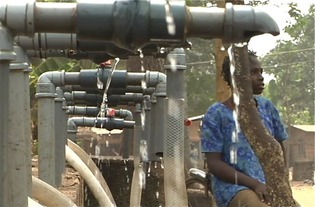 One of the more life-affirming accomplishments of the Marycare organization was a joint effort with the Greenwich World Hunger Association to fund and build a water project for the village. The construction project was a community effort with everyone pitching in, marking a miraculous upgrade in community living standards. Until that time, villagers would have to trek up to four miles to fetch water from what was a contaminated Njaba River; many would perish from accidents along the way. Father Emmanuel’s own sister died of typhoid, one of the water-borne illnesses that claimed lives every week.
One of the more life-affirming accomplishments of the Marycare organization was a joint effort with the Greenwich World Hunger Association to fund and build a water project for the village. The construction project was a community effort with everyone pitching in, marking a miraculous upgrade in community living standards. Until that time, villagers would have to trek up to four miles to fetch water from what was a contaminated Njaba River; many would perish from accidents along the way. Father Emmanuel’s own sister died of typhoid, one of the water-borne illnesses that claimed lives every week.
The story of the water project is captured in a moving short film entitled “Water is Life” by film maker Roger Ingraham. Ingraham journeyed with Father Emmanuel to Africa to film the priest’s first mass in his home town and took the opportunity to document some of the life-changing events occurring there.
Building upon their successes in 2008, this year’s Village to Village volunteers sought to expand the scope of the education program to include scholarships for students seeking higher education. The annual cost to attend college is around one thousand dollars, a prohibitive cost for villagers.
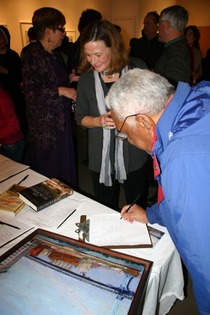 Helping to make that goal a reality, were event attendees like State Representative Pat Dillon (pictured) and husband Jack, who engaged in a spirited bidding battle with Westville resident Tony Burton, for the right to take home “Down Under the Manhattan Bridge Overpass,” a landscape painting donated by Westville artist Joseph Adolphe. Dillon also successfully bid on a Frank Bruckmann print of West Rock and “The Bonfire” a new historical novel by Westville author Marc Wortman.
Helping to make that goal a reality, were event attendees like State Representative Pat Dillon (pictured) and husband Jack, who engaged in a spirited bidding battle with Westville resident Tony Burton, for the right to take home “Down Under the Manhattan Bridge Overpass,” a landscape painting donated by Westville artist Joseph Adolphe. Dillon also successfully bid on a Frank Bruckmann print of West Rock and “The Bonfire” a new historical novel by Westville author Marc Wortman.
In addition to her legislative work that day, Dillon attended three fundraisers. “There’s a lot of need and also great civic spirit in New Haven,” she noted. Westville Wines and The Forest Package Store in nearby West Haven, joined in the civic outpouring through generous donations of wine. Proceeds from the silent auction, event tickets, and general donations netted close to seven thousand dollars on behalf of Ejemekwuru and its people.
During a pause in the festivities at the Village to Village fundraiser, another short Ingraham film “Heart of Africa,” was screened before a hushed audience. The story of Marycare’s impact on the village is told primarily through the faces of villagers. There is almost no narration, but the powerful film coveys the joy and gratitude of the villagers in their liberation from the tyranny of distance and contaminated river waters.
Father Emmanuel, dressed in smart, but casual street attire, stood before the gallery crowd with microphone in hand to convey his personal gratitude: “I wish the heart had a zipper” he said, “I would open it to show you my gratitude and my love.”
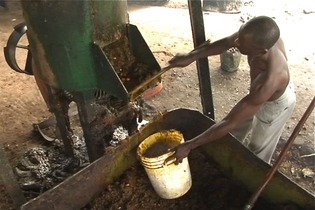 Father Emmanuel said he visits his village annually, overseeing and coordinating Marycare operations directly. The key to Marycare’s success has been the ability to have community people on the ground, circumventing government bureaucracies that sometimes work at cross-purposes where charitable organizations are concerned. Future projects include development of more agribusinesses, such as the palm oil mill (pictured) that currently provides employment for several villagers through processing of the local staple. He also said that there is a great need of a medical clinic for his struggling village — a dream that will no doubt become a reality with the continued help of his friends and supporters in Westville Village.
Father Emmanuel said he visits his village annually, overseeing and coordinating Marycare operations directly. The key to Marycare’s success has been the ability to have community people on the ground, circumventing government bureaucracies that sometimes work at cross-purposes where charitable organizations are concerned. Future projects include development of more agribusinesses, such as the palm oil mill (pictured) that currently provides employment for several villagers through processing of the local staple. He also said that there is a great need of a medical clinic for his struggling village — a dream that will no doubt become a reality with the continued help of his friends and supporters in Westville Village.
The Village to Village fund is continuing collection efforts. Those wishing to donate, may send their tax deductible donations made out to Marycare, Inc., 203 Willard St. New Haven, CT 06515.